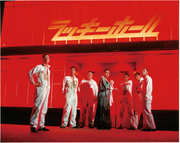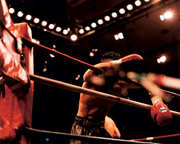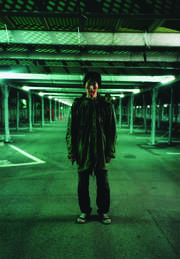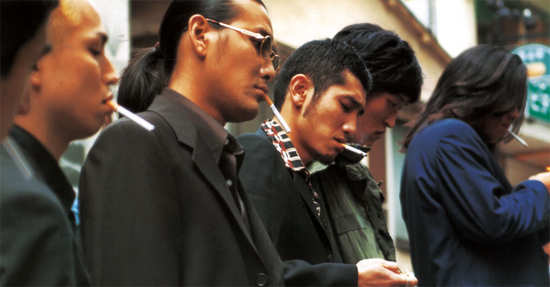Review for Toshiaki Toyoda: The Early Years - Limited Edition
Introduction
Here’s a first world problem for you, the exclusive boxset. I’m sure that every collector has come across this issue before. You like a movie, may even love it, but it’s only available as part of a boxset collection. Price might be a factor, but by the time a collector is having this particular issue, it’s more likely a lack of shelf space, and for the more environmentally minded, a sense of waste regarding the films that you don’t want, and the extra packaging. It becomes a choice between waiting for a single disc release that might never come, and taking a chance on a handful of films that may or may not entertain you, just to have the one film that you really want.
Now I love Toshiaki Toyoda’s 9 Souls. I reviewed the Artsmagic DVD for this site way back in 2005, back when we still operated the Reviewer Lucky Dip, and a bunch of random Japanese live action movie discs had started ending up in my in-tray. I knew little to nothing about Japanese cinema back then, and approached each disc with a sense of wariness, a sense that was heightened at that time as I had recently reviewed, and been utterly disappointed by Kichiku Dai Enkai, and was on the verge of ditching the live action stuff, sticking to anime instead. Then along came 9 Souls, and I was utterly blown away by one of the most engaging, entertaining, and thought-provoking pieces of independent cinema that I had seen up to that point. And so began an appreciation for Japanese cinema that has lasted ever since.
You can imagine the whoop that echoed around my neighbourhood when Third Window Films announced that 9 Souls would get a Blu-ray release, but it was a little tempered when I learned that it was as part of a Toshiaki Toyoda Early Years Boxset, alongside his movie, Pornostar, and the documentary Unchain, two films I have never seen before, and know nothing about. It’s that first world problem again! In a situation like this, I need a review or two to know whether it’s worth getting the boxset. I better write one then...
The images in this review were kindly supplied by Third Window Films.
Introduction: Pornostar
A surly young man in a hooded anorak, walking through Shibuya like he’s Richard Ashcroft in the Bittersweet Symphony video doesn’t bode well. In this case it doesn’t bode well for the local yakuza, as this man has decided that the one thing that the world doesn’t need is petty gangsters, and after bumping into a long-haired local gang member and picking up his knife, he’s got a free hand to go cleaning up the town. One man with a knife can’t get that far, and soon he’s lying, battered and bloody in the local yakuza’s office. The boss tells Kamijo, the long-haired guy who dropped the knife in the first place, to kill the young man and be done with it. But Kamijo’s not committed to being a yakuza just yet, and he sees something in the young man that he can use. But he’s just grabbed onto the tiger’s tail.
Picture: Pornostar
Pornostar gets a 1.85:1 widescreen 1080p transfer. It’s a decent enough digital presentation, clear throughout, with no sign of digital artefacts, compression or banding. It’s a filmic presentation as well, with an organic layer of film grain, but I was going to note the somewhat dull colour palette, the lack of contrast, particularly in darker scenes, and the sense of natural light to the image not quite bringing it out at its best. Then I noticed in the extras that Pornostar was shot on 16mm film, and with that in mind, this is one of the better 16mm presentations on Blu-ray that I have seen so far. It’s watchable, the film is stable throughout, and dirt and print damage are mostly absent.
Sound: Pornostar
The audio is presented in DTS-HD MA 2.0 Stereo Japanese with optional English subtitles. There are burnt in Japanese subtitles for the English dialogue in the film. The dialogue is clear throughout, and the film’s music soundtrack can offer some evocative rock when required. The subtitles are accurately timed and are free of typos.
Extras: Pornostar
The disc presents its content with an animated menu screen, and you’ll easily find the film’s trailer, presented in 720p, as well as the Early Years Boxset trailer.
The audio commentary from Tom Mes might be a smidge harder to locate, nestled as it is in the audio options. It’s nice and detailed, very informative, and easy to listen to.
Finally there is an interview with director Toshioki Toyoda which lasts 14:05 and is presented in 1080p, although it’s less about this film in particular, and more his career in general.
Conclusion: Pornostar
In my habit of drawing comparisons, the blurb to Pornostar put me in mind of Falling Down, both films having protagonists of questionable morality, taking on self appointed missions to sort out society’s ills. But in the commentary, comparisons are more rightly made to Clint Eastwood’s Man with No Name trilogy, although for me High Plain Drifter is a closer fit. Falling Down’s D-Fens got humanised by the end of that film, got a back-story which diminished the film in my opinion. In Pornostar, the protagonist remains nameless throughout, the motivations behind his killing spree remain opaque, and he comes across as a force of nature, the only humanity ascribed to him his vulnerability.
The film then becomes more about potential yakuza Kamijo, who at the start of the film is throwing his weight around like any petty thug, and with his gang runs errands for the local yakuza boss. They’re paying obeisance when the stranger walks into the office, having stabbed one of the yakuza’s ticket touts. He’s quickly restrained, and the boss tells Kamijo to kill him, but Kamijo stays his hand. Perhaps it’s his statement that he’s not a yakuza yet, and that his devotion to his mother stops him from taking that final step that reaches the stranger, so that when Kamijo relents and spares his life, the stranger starts tagging along with Kamijo and his gang.
Of course it could be that the errands that Kamijo runs brings the stranger into contact with yakuza and other criminals that he can kill with impunity. He’s like a hurricane that is liable to damage everything in its path, and he’s as much benefit as hazard to Kamijo’s gang. It causes no little friction inside the gang, while the Shibuya underworld gets shaken up as well. But it seems as if Kamijo is intent on riding this dragon to success, bypassing the usual ladder rungs that signify a yakuza’s climb. On the other hand, it could be that the stranger is just waiting for Kamijo to cross the line.
It’s not all relentless violence. There are quieter moments as well, which as mentioned reveal the humanity and the vulnerability in the stranger. There’s a scene with a bunch of kids in a skate park, the stranger learning to ride a skateboard with Kamijo’s girlfriend. She sees something of interest in this aloof outsider, and even sees a way of getting out of her dead-end life as a wannabe yakuza’s girlfriend, deciding to take the stranger with her. It doesn’t quite work out as she plans.
There’s a punk sensibility to Pornostar that you can see sowing the seeds of 9 Souls. It has a spontaneity and energy to it that is refreshing, and the story always managed to surprise me throughout the film. It’s an interesting examination of the dark side of human nature through the petty criminal underworld in Shibuya. It can be astoundingly brutal at times, but it also has a rich vein of black comedy to it.
8/10
Introduction: Unchain
Unchain Kaji was a boxer who took his ring name from a Ray Charles song. He had a perfect record in his career, six losses and one draw. He never won a bout before injury forced his retirement. This documentary looks at his life, his brief career in boxing, and his life after his retirement. It also looks at some of his friends and peers from the fight scene.
Picture: Unchain
Unchain gets a 4:3 pillarboxed 1080p transfer, although the technical aspects are less of interest given that most of the footage in this film is VHS quality, with a little bit of 16 mm thrown in. There’s certainly nothing to challenge the limits of the HD format here. But it’s all clear, and watchable enough given the context of the documentary.
Sound: Unchain
You have a DTS-HD MA 2.0 Japanese soundtrack, with all of the pertinent dialogue subtitled, although there is the odd moment of confusion when on screen text is captioned, and those captions show up in the subtitle stream instead of separately elsewhere on the screen.
Extras: Unchain
The disc boots to an animated menu, and offers you the film’s trailer, Unchain Kaji singing ‘Impudent Man’ (8:02), a Music Video (4:37), Marketing Materials (2:24 slideshow), and the Early Years Boxset trailer again.
Conclusion: Unchain
A good documentary will broaden your knowledge about a subject you care passionately about. A great documentary will get you enthused about a subject you care nothing for. Unchain is a good documentary. For every professional or amateur fighter that you hear about, there will be a thousand others toiling away in small gyms, training up and fighting small bouts in the hope of hitting the big time. Unchain is about these fighters, boxers, kick-boxers, and shoot-boxers, who work every-day jobs, hit the gym every evening, and stake everything on a handful of three-minute rounds to prove their worth. Unchain Kaji, Tetsu Garuda, Seiichiro Nishibayashi, and Osamu Nagaishi all showed promise early on, but they’ll never be headlining Vegas.
Unchain Kaji’s life is at the centre of this documentary, the others are friends that he made during his career, who fought in different disciplines, even if they worked out at the same gym. Through a mixture of interviews, archive video footage, photos, and a few dramatic recreations, we’re taken through Unchain Kaji’s life, although the man himself doesn’t appear in contemporary footage early on. From childhood to his career, and the downward spiral that ensued following his forced retirement, it almost feels as if the documentary is more of a tribute, recounting Kaji’s more colourful antics. But as the film unfolds, his antics become more colourful and less entertaining, until the reason behind his absence from the first half of the film is revealed.
I’m not interested in boxing, or the fight scene, although I was compelled by this film to find out what shoot-boxing is (an early MMA that is a mix of boxing, kick boxing and wrestling). This film then only really connected with me on a human level, and it does pretty well exploring these people, their dreams and ambitions, and the ultimate realisation that not all ambitions are achievable. Some manage to move on with their lives, some dream of lost glories, and some are unable to give up the dream.
Unchain Kaji is an interesting look at the less glamorous side of boxing, but it’s a documentary that will most appeal to those with a stronger interest than I. I know that if I feel the need to wander through a seedy boxing gym somewhere in Japan, I’ll be picking up another Third Window title from this year instead, Kids Return.
6/10
Introduction: 9 Souls
The 9 Souls in question refer to the nine prisoners who make a break for freedom at the start of the film. An eclectic collection, delinquents, a drug dealer, murderers and a mad bomber who sneak out with one aim in mind, a stash of loot hidden in a time capsule in the Mt Fuji Elementary School, as related to them by a fellow prisoner. These oddball characters quickly hijack a battered camper van, and follow Torakichi, the de facto leader through the countryside. However, what begins as a darkly comic road movie becomes intensely personal as we learn about each of these characters and follow them on their individual journeys, by turn comic and tragic, and occasionally even surreal.
Picture: 9 Souls
9 Souls gets a 1.85:1 widescreen 1080p transfer on this Blu-ray. The transfer itself is fine, with no signs of compression or digital artefacts. The source material is another matter. The image is mostly clear and sharp, especially in brighter scenes, although detail levels are never more than fair. The contrast isn’t all that strong, with blacks tending more to grey; darker scenes especially suffering, while the colour palette is somewhat subdued, even faded. This never looks like a vibrant or visually impressive feature, and my guess is that it’s down to the rather grainy film stock that was common in Japanese cinema of the period. It’s not the best ever Blu-ray presentation of a movie, but if you compare it to the old Artsmagic DVD, the difference is still like night and day.
Sound: 9 Souls
The audio is presented in DTS-HD MA 2.0 Stereo Japanese, with optional English subtitles. The escape sequence with the names captioned has a mistake in it (Shiratori spelt as Shiartori), which makes me suspect that this release reuses the Artsmagic subtitle script. The film also has Japanese subtitles burnt into the film during the odd moments of Filipino dialogue. The audio is fine, the dialogue is clear throughout, the moments of action come across well, and the show’s great soundtrack really drives the emotional tone of the story.
Extras: 9 Souls
The disc boots to an animated menu where you’ll find the trailer for 9 Souls (1:55 720p), and the Toyoda Boxset trailer again.
Of more interest will be the Making of 9 Souls, which lasts 24:31, is present in 720p, and takes us behind the scenes of the filming, interspersed with clips from the film, and an interview with Toshiaki Toyoda.
There are 25:29 of Outtakes, which bundle together the deleted, extended, alternate scenes along with some bloopers. Again this is in 720p.
Finally there is the Audio Commentary from Jasper Sharp; again it’s nice, detailed, informative, and easy to listen to.
Conclusion: 9 Souls
The jailbreak is a common theme in cinema, indeed director Toshiaki Toyoda was inspired by The Great Escape to make 9 Souls, but 9 Souls is more inspirational than inspired, as he fashions a tale that is by turns comic, tragic, poetic and spiritual, and is never anything less than compelling and utterly engrossing. At first it seems like your traditional jailbreak as these characters run for their freedom. I love the title sequence as they make their break, a powerful rock soundtrack urging them on, and freeze frame used to introduce each of the oddball crew. Dressed identically, they are initially difficult to distinguish, yet as the film progresses, Toyoda manages to fully flesh out each of these distinct personalities, and tell nine individual stories.
It is very rare to find a film that elicits such emotion, laughter and tears in equal measure without being saccharine and schmaltzy, yet 9 Souls manages to evoke sympathy for these criminals, which is unexpected and surprisingly genuine. It helps in that these aren’t the kind of career criminals who are ultimately intent on re-offending as soon as they escape, but rather they are all in search of some form of redemption, to escape their past, or even to make amends in some way. Naturally they all go about it in the wrong way. The shifts between comedy and tragedy are really quite subtle, never telegraphed, and are more effective for it. These hardened criminals, some who haven’t seen a woman in years escape from prison, yet the first thing they do is crash their stolen camper van into a field of sheep. What follows is hilarious. The fact that the disguises that they wear during their escape are always identical is so understated that it’s easy to miss, but is no less funny for that.
As we get to know the characters, we learn about what drives them, and what they seek, their individual stories become more tragic. Kamei just wants to marry his sweetheart, Ushiyama wants a normal life, and Saruwatori wants to see his girlfriend again. Perhaps the most interesting dynamic in the film is that of Torakichi who murdered his son, and Kaneko who killed his father. Once again, all these characters are beautifully drawn, understated for the most part, and it’s our reaction to them that fills in the gaps. The ending is wonderfully ambiguous, but never gimmicky; it’s a moment that leaves you thinking and if possible makes the film even better.
9 Souls is a film about escaping the prisons we make for ourselves. Powerful direction coupled with moving performances makes this an unforgettable experience. I loved this movie on that somewhat lacking Artsmagic DVD, and I love it even more on this far more pleasing Blu-ray. It’s an inspired piece of Japanese cinema which really drew me into the medium, and which still holds a warm place in my heart as a result. But it’s a great film in its own right too, and for me, the best thing in this boxset.
9/10
In Summary
You don’t have to worry about boxset redundancy. Each item in this collection is well worth watching, and even if you’re like me, and boxing documentaries aren’t at the top of your Christmas list, Unchain is still very watchable. But Pornostar is an entertaining movie, and I’m biased but 9 Souls is transcendent. The only complaint that I have, and it wouldn’t be a review without a complaint, is that if you own the Artsmagic DVD, you can’t throw it out just yet, as its extra features, particularly the Tom Mes audio commentary and the interviews with Toshiaki Toyoda aren’t repeated on the Blu-ray. Still, it’s a small complaint from a man with too little shelf space.
















































Your Opinions and Comments
Be the first to post a comment!